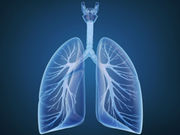Health care use for URI higher within one week of elevated fine particulate matter, especially for infants
MONDAY, April 16, 2018 (HealthDay News) — Short-term exposure to fine particulate matter (PM2.5) is associated with increased health care utilization for acute lower respiratory infection (ALRI), according to a study published online April 13 in the American Journal of Respiratory and Critical Care Medicine.
Benjamin D. Horne, Ph.D., M.P.H., from the Intermountain Medical Center Heart Institute in Salt Lake City, and colleagues examined the correlation between ambient PM2.5 levels and health care encounters for ALRI in an observational case-crossover study. A total of 146,397 subjects were studied if they had an ALRI diagnosis. PM2.5 air pollution concentrations were measured between 1999 and 2016; after stratification by ages, odds ratios for ALRI health care encounters were calculated.
The researchers found that the odds of ALRI encounter for the 112,467 subjects aged 0 to 2 years of age increased within one week of elevated PM2.5, and peaked after three weeks, with a cumulative 28-day odds ratio of 1.15 per +10 µg/m³. Following elevated ambient PM2.5 levels, ALRI encounters with diagnosed and laboratory-confirmed respiratory syncytial virus and influenza increased. Older children had similar elevated odds for ALRI, although the number of events and precision of estimates were much lower.
“Short-term exposure to elevated PM2.5 air pollution was associated with greater health care utilization for ALRI in both young children, older children, and adults,” the authors write. “Further exploration is needed of causal interactions between PM2.5 and ALRI.”
Copyright © 2018 HealthDay. All rights reserved.








